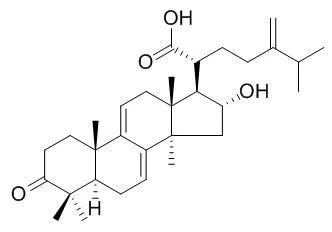Lung cancer continues to be the leading cause of cancer-related mortality worldwide. This warrants the search for new and effective agents against lung cancer. We and others have recently shown that lanostane-type triterpenoids isolated from the fungal species Poria cocos (P. cocos) can inhibit cancer growth. However, the mechanisms responsible for the anticancer effects of these triterpenoids remain unclear.
METHODS AND RESULTS:
In this study, we investigated the effect of Polyporenic acid C (PPAC), a lanostane-type triterpenoid from P. cocos, on the growth of A549 nonsmall cell lung cancer cells (NSCLC). The results demonstrate that PPAC significantly reduced cell proliferation via induction of apoptosis as evidenced by sub-G1 analysis, annexin V-FITC staining, and increase in cleavage of procaspase-8, -3, and poly(ADP-ribose)-polymerase (PARP). However, unlike our previously reported lanostane-type triterpenoid, pachymic acid, treatment of cells with PPAC was not accompanied by disruption of mitochondrial membrane potential and increase in cleavage of procaspase-9. Further, PPC-induced apoptosis was inhibited by caspase-8 and pan caspase inhibitors but not by a caspase-9 inhibitor. Taken together, the results suggest that PPAC induces apoptosis through the death receptor-mediated apoptotic pathway where the activation of caspase-8 leads to the direct cleavage of execution caspases without the involvement of the mitochondria. Furthermore, suppressed PI3-kinase/Akt signal pathway and enhanced p53 activation after PPAC treatment suggests this to be an additional mechanism for apoptosis induction.
CONCLUSIONS:
Together, these results encourage further studies of PPAC as a promising candidate for lung cancer therapy. |






 Cell. 2018 Jan 11;172(1-2):249-261.e12. doi: 10.1016/j.cell.2017.12.019.IF=36.216(2019)
Cell. 2018 Jan 11;172(1-2):249-261.e12. doi: 10.1016/j.cell.2017.12.019.IF=36.216(2019) Cell Metab. 2020 Mar 3;31(3):534-548.e5. doi: 10.1016/j.cmet.2020.01.002.IF=22.415(2019)
Cell Metab. 2020 Mar 3;31(3):534-548.e5. doi: 10.1016/j.cmet.2020.01.002.IF=22.415(2019) Mol Cell. 2017 Nov 16;68(4):673-685.e6. doi: 10.1016/j.molcel.2017.10.022.IF=14.548(2019)
Mol Cell. 2017 Nov 16;68(4):673-685.e6. doi: 10.1016/j.molcel.2017.10.022.IF=14.548(2019)